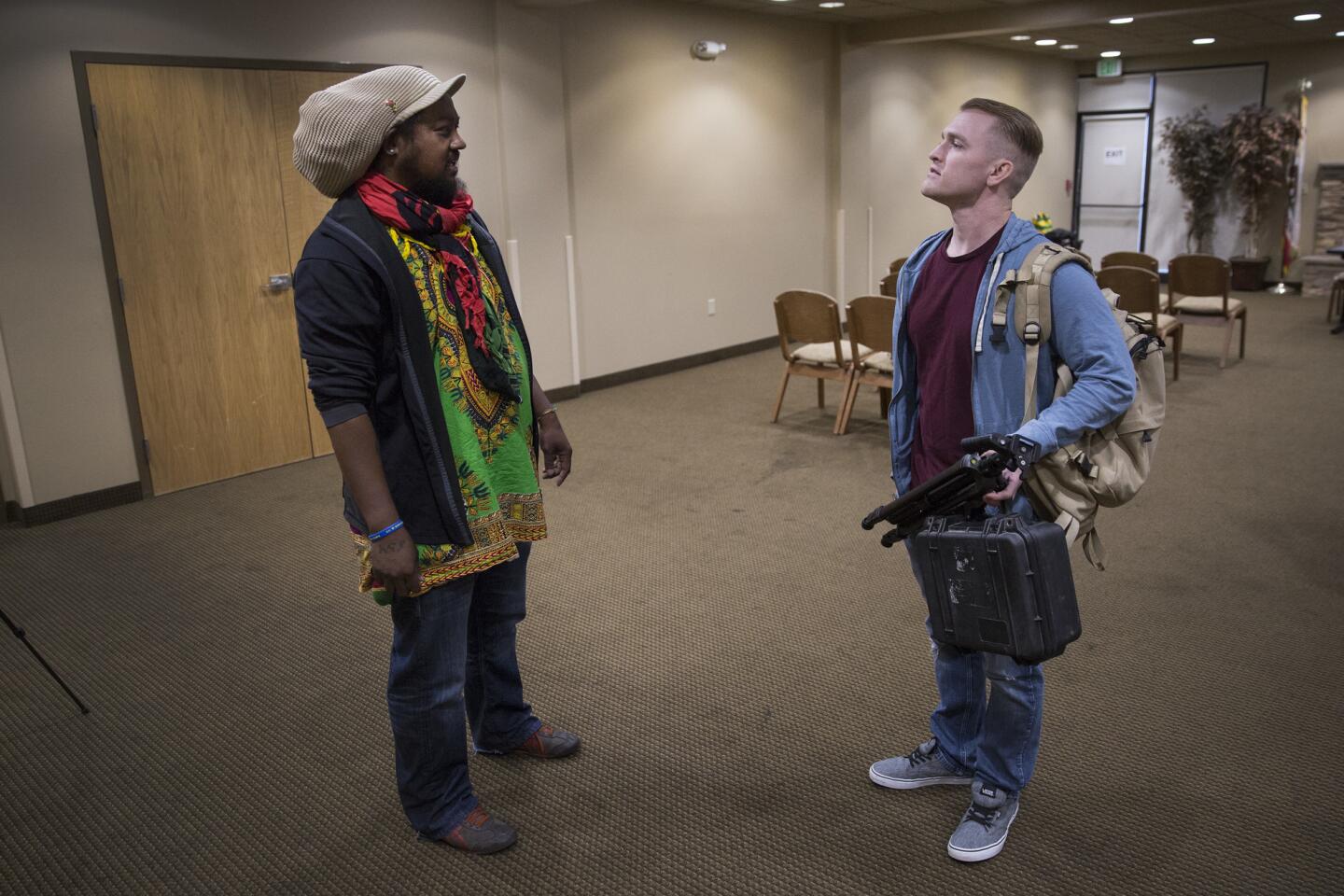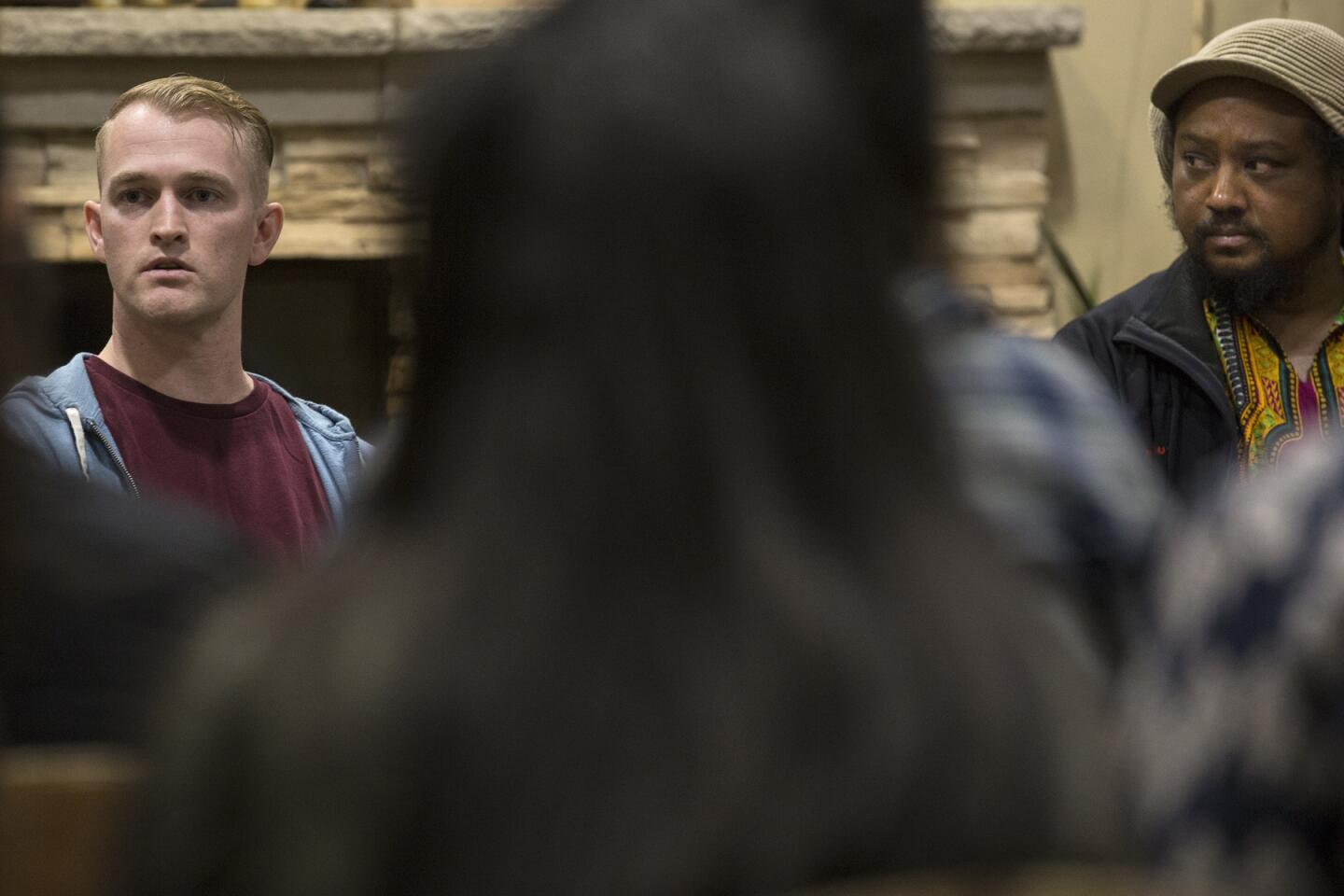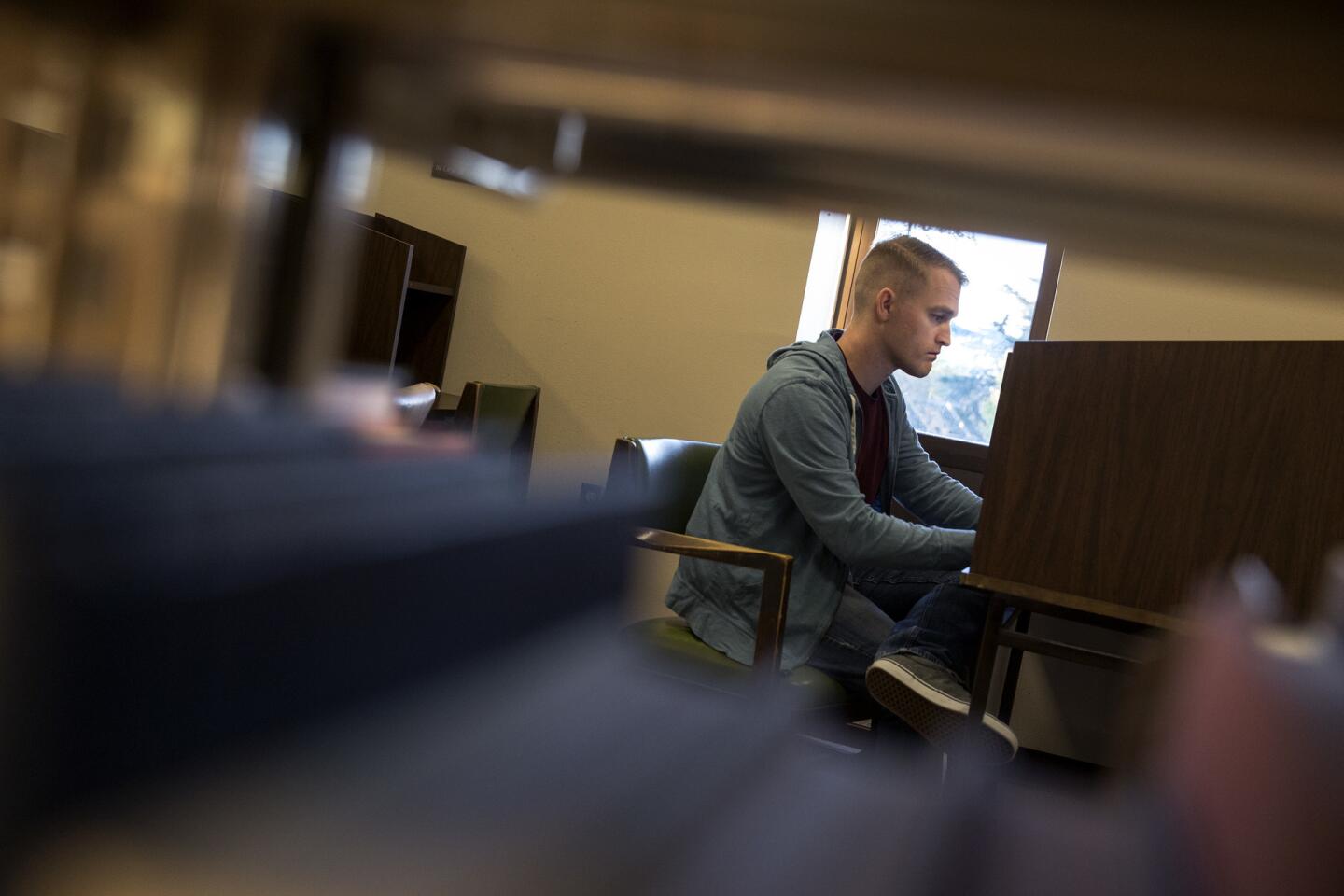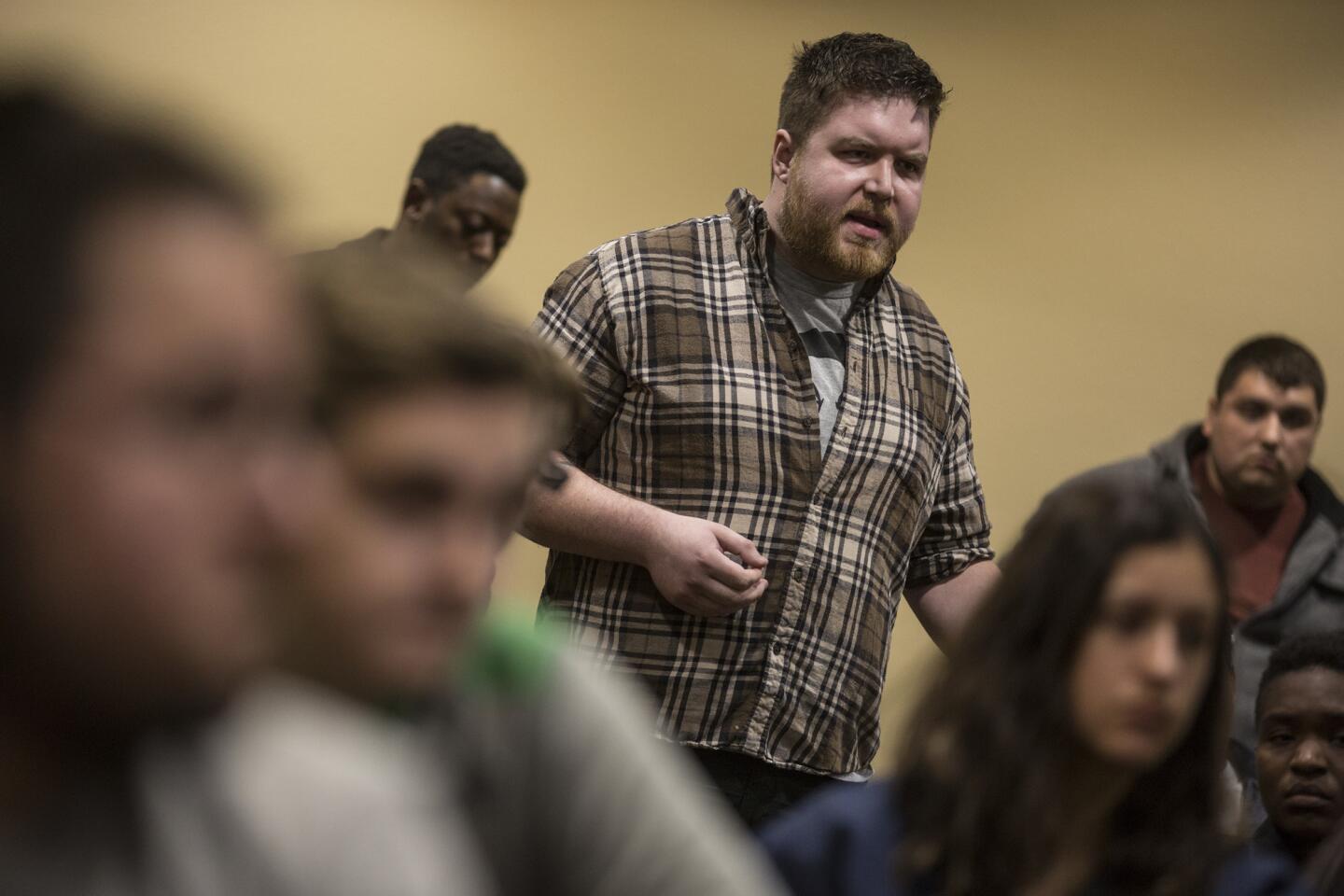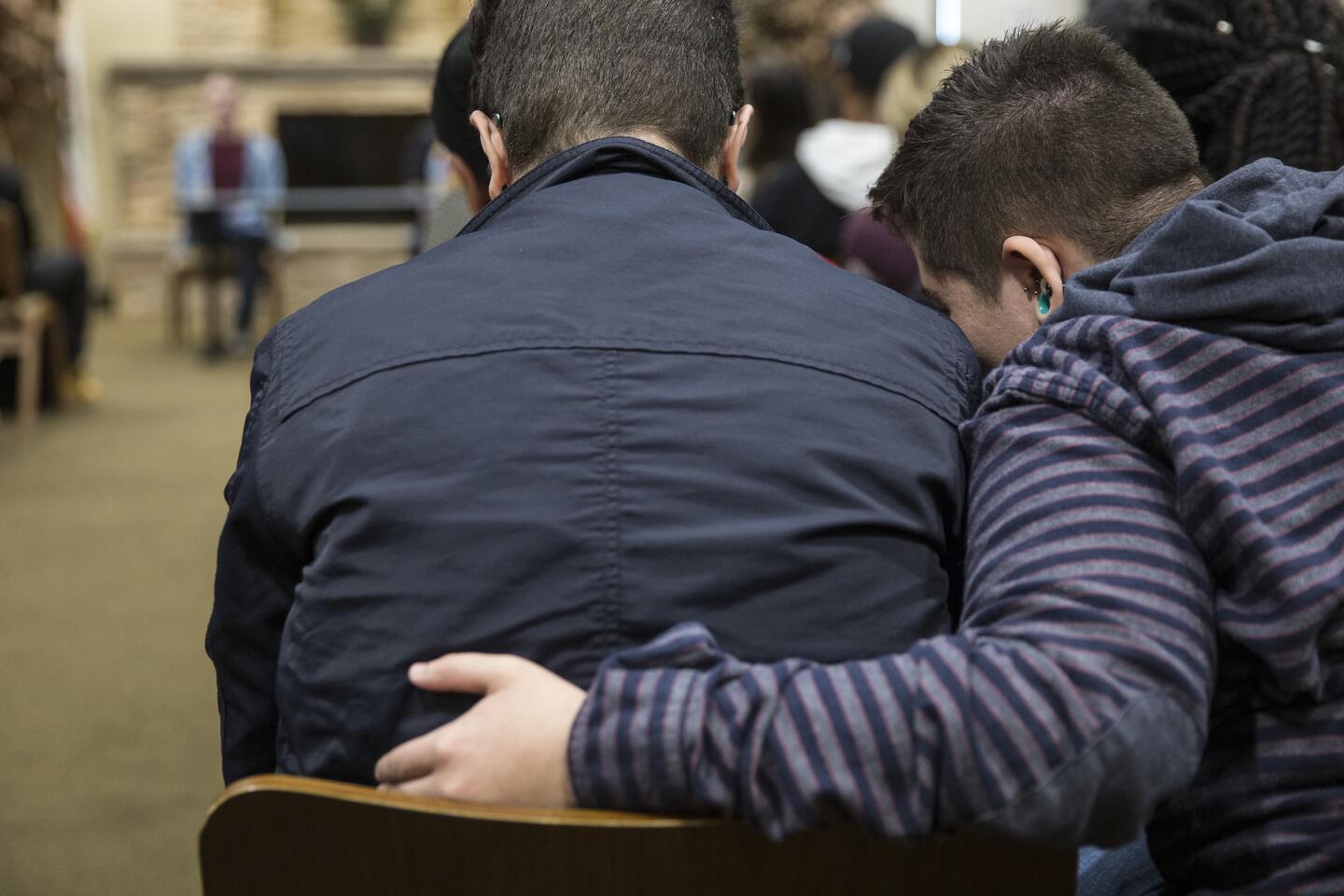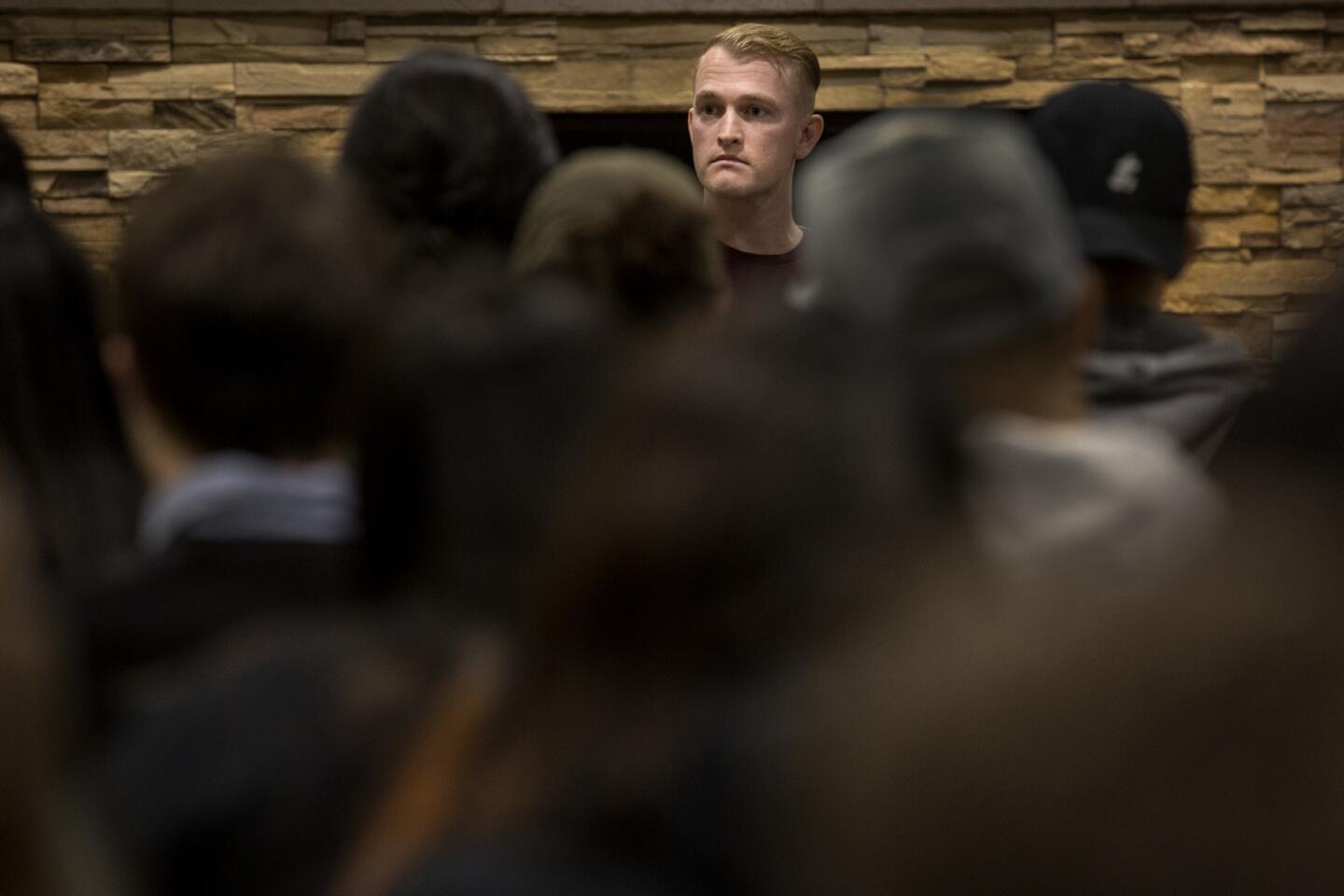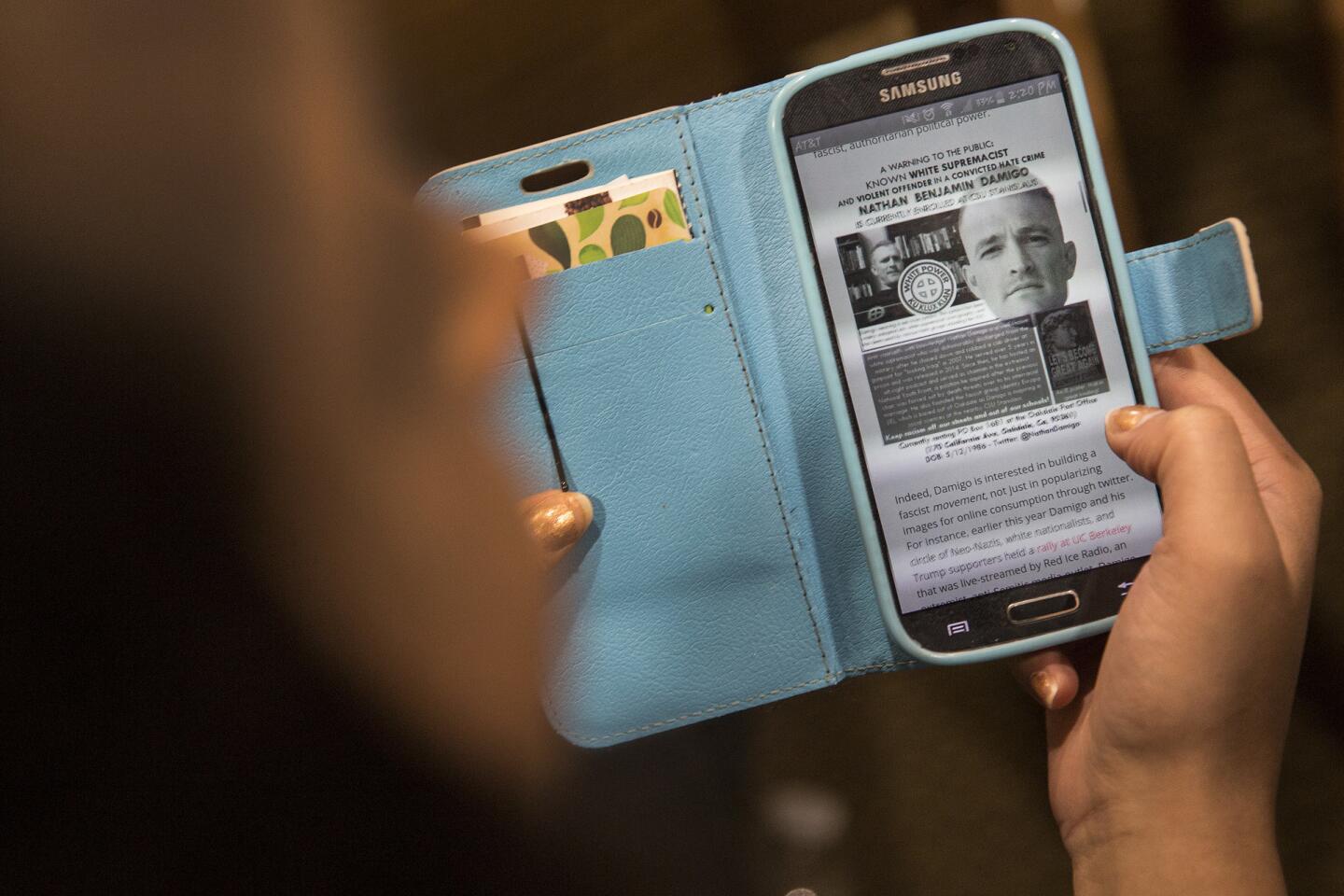In diverse California, a young white supremacist seeks to convert fellow college students

Nathan Damigo, a former Marine corporal and the founder of a white nationalist organization, is an increasingly sought-after voice in the so-called alt-right movement. (Brian van der Brug / Los Angeles Times)
- Share via
Reporting from Turlock, Calif. — Nathan Damigo brought his message of white separatism to an unusual place: an ethnic studies class at Cal State Stanislaus called Searching for America.
Speaking to a crowd filled with black and Latino students, he wove a country song tale of whites becoming an endangered minority in America and compared their plight to Native Americans — before describing his fantasy for a utopian homeland for whites not unlike Indian reservations.
“Even though horrible things did happen to the indigenous people … there was land set aside where they could be who they were and express themselves how they wanted to, and they could have a form of government that reflected them,” Damigo said. “And I think that is something that we want.”
The comparison elicited aghast stares from the crowd late last month. It was a reminder that Damigo, a 30-year-old Cal State Stanislaus student, was far from a gathering one recent weekend in Washington with like-minded white men, some of whom stretched out their arms in Nazi salutes.
Damigo, a former Marine corporal and the founder of a white nationalist organization, is part of the so-called alt-right movement. Some experts who study extremism say he is emblematic of the young, web-savvy racists who are trying to intellectualize and mainstream bigotry. Damigo and others like him have set their sights in particular on college campuses, eager to take on hostile audience in hopes of getting their message across.
In the ethnic studies class, Damigo told students that immigration and diversity were destroying the country and that no place heralded the decline of whites’ fortunes in America like his home state of California.
“California was never white,” Jonathan Grammatico, a white 25-year-old social work student, shot back at Damigo at one point. “It belonged to indigenous people and then to Mexicans.”
Damigo’s address came courtesy of Fela Uhuru, an ethnic studies instructor who identifies as Asian, black and Native American and has the African continent tattooed on his arm. He said he wanted his students to have a frank dialogue about race and identity with someone whose presence on campus has stirred controversy.
Damigo has been on an emotional high since Donald Trump won the presidency.
The day after the billionaire’s victory, Damigo propped his cellphone up in his car, turned on the Periscope live-streaming app and started talking.
“We as the alt-right are the reason why Trump won,” he said, laughing. He then held up a bullhorn and described how, as he drove home from celebrating with friends in Folsom, he had shouted at people who were presumably not white: “You have to go back!”
The loosely defined alt-right, a white nationalist movement, has been emboldened by Trump and his rhetoric about Mexicans and Muslims, his sharing of white supremacists’ tweets and his appointment of Stephen K. Bannon — the outgoing executive chairman of Breitbart News, a purveyor of alt-right ideology — as his chief strategist.
Despite California’s contemporary liberal politics and celebrated diversity, California has a well-established history of racism and racially polarizing efforts. For decades, the Golden State has been home to the largest racist skinhead population in the country, primarily concentrated in diverse Southern California, according to the Anti-Defamation League. The state’s history books are filled with cruel treatment of ethnic minority groups, ranging from the internment of Japanese Americans during World War II to exploitative treatment of laborers from Latin America and elsewhere. Just two decades ago, California voters approved a proposition that would have stripped people in the country illegally of many public benefits.
California today is considered one of the most liberal and diverse states in the union, adopting strong protections and services for those here illegally.
Still, earlier this year, a Ku Klux Klan rally in Anaheim and a neo-Nazi event outside the state Capitol erupted in violence. Bakersfield last year was the site of Camp Comradery, a national gathering that featured a unique collaboration between so-called “intellectual racists” and racist skinheads, said Joanna Mendelson, an investigative researcher with the California branch of the Anti-Defamation League.
The state has just radically changed. If you’re white and you live here, it’s like being in a foreign country.
— Nathan Damigo
“Often, in areas that have undergone enormous demographic shifts, some of these racist and bigoted voices emerge as people feel threatened,” Mendelson said. “They feel that they are fighting against a rising tide of color that’s threatening their future existence.”
In a Periscope video the week of Trump’s election, Damigo fantasized about “Calexit,” the proposed secession of California.
“The remaining few of us who are white would white-flight ourselves out of here and join you guys in the rest of the country, and we could do our own thing and California could just pretty much devolve into cannibalism,” he said, snickering.
He mentioned his hometown of San Jose, which, he said, looked much different than when his grandparents moved there decades ago.
“The state has just radically changed,” Damigo said. “If you’re white and you live here, it’s like being in a foreign country.”
He grew up in the Silicon Valley and attended a private Baptist school that, he said, was racially diverse. He never had any bad experiences with his nonwhite classmates.
Still, he said, even as a child he believed there were “double standards” about race and who was allowed to talk about and celebrate it. He’d go to his Filipino friends’ birthday parties, only to long for the kind of shared culture they had.
Damigo joined the Marines in 2004, at age 18, and did two tours in Iraq. There, he said, he saw firsthand the conflicts between the country’s ethnic and religious groups.
“I said, ‘This is dumb. Why don’t … each one of them have their own country and they can all express themselves and ... they’re not, you know, fighting with each other,” he said.
Damigo lost a few friends to the war, and came back in bad shape. After his first tour, he tried to commit suicide, but a friend intervened, according to San Diego County court records.
In November 2007, he had been home for a month after his second tour of duty and was suffering from severe post-traumatic stress disorder, drug and alcohol abuse, paranoia and flashbacks, court records show. A few days after the anniversary of a friend’s combat death, he spent a night drinking and went for a walk with a gun he’d gotten two days before as a gift. He came across a La Mesa cab driver who he thought was Iraqi, put a gun to his head and robbed the man of $43, records show.
He was convicted of armed robbery and spent a year in county jail and four years in prison for the crime.
Damigo said he was embarrassed and guilt-ridden by the robbery. Still, he considers the time alone in prison a gift of sorts.
“Because you have nothing but time to think in prison, that’s when I finally started looking at the more intellectual roots and started researching books and literature on race and identity,” he said.
He was greatly influenced, he said, by “My Awakening,” the book by former Ku Klux Klan leader David Duke, and by racial provocateurs J. Philippe Rushton and Nicholas Wade.
He came out of prison with a belief that there is a genetic basis for certain behaviors and intellect, distinguished by race — that a black person is more likely than a white person to be less intelligent and more violent, for example.
Such ideas have been roundly denounced by biologists and geneticists as unscientific. And racist.
For some time after prison, Damigo led the now-defunct National Youth Front, the youth wing of the nationalist American Freedom Party, which the Southern Poverty Law Center describes as an organization founded by “racist Southern California skinheads that aims to deport immigrants and return the United States to white rule.”
In March, Damigo founded Identity Evropa, which bills itself as a “generation of awakened Europeans” who “oppose those who would defame our history and rich cultural heritage.” Among the application questions for Identity Evropa is whether applicants are “of European, non-Semitic heritage.”
The group posts fliers around college campuses nationwide with slogans like “Let’s Become Great Again” and “Protect Your Heritage.”
In October, after Identity Evropa’s material began appearing on California campuses, someone posted fliers on Cal State Stanislaus’ campus with Damigo’s face and a warning that he was a “known white supremacist and violent offender.”
The university’s president, Ellen Junn, said in a statement at the time that while safety was her top priority, she believed in the freedom of speech on campus, even if it was offensive.
Brian Levin, director of the Center for the Study of Hate & Extremism at Cal State San Bernardino, said Identity Evropa’s description reads like “a template that exists within the alt-right.”
“A lot of these young guys dig these Western civilization ramblings and attempt to intellectualize bigotry,” Levin said. “It tries to put a pseudo-intellectual veneer that revolves around identity and history and the notion that the accomplishments of Western civilization are under attack by our increasingly diverse and multicultural society.”
These guys are like vape shops — they’re starting to spring up everywhere, and there’s nothing particularly new or creative about it.
— Brian Levin, director of the Center for the Study of Hate & Extremism at Cal State San Bernardino
“These guys are like vape shops — they’re starting to spring up everywhere, and there’s nothing particularly new or creative about it.”
While such groups try to distance themselves from groups like the KKK and neo-Nazis, the first sign Levin saw at this year’s Klan rally in Anaheim said, “Stop white cultural genocide.”
Standing 5-foot-5, Damigo wears the same haircut — long on top, with shaved sides — favored by members of the alt-right. Last year, he got a DNA test as an “affirmation” of his whiteness.
On Twitter, where he uses the name “Fashy Haircut” (as in fascist), he regularly posts photos in front of his bookcase, which includes titles by the likes of Ann Coulter and Bill O’Reilly, books about genetics, race and evolution — and books from the “Twilight” vampire series.
In person, Damigo’s language is more circumspect than it is in the digital realm, frustrating students in the ethnic studies class. Uhuru, the instructor, asked him about the fliers on campus that characterized him as a white supremacist.
“Language like, you know, ‘racist,’ ‘supremacist,’ many of those words have become so horribly loaded that oftentimes they’ve gotten to the point where I personally will consider some of that language, if they’re used in a sense of moralizing a situation and used to obfuscate from an actual empirical argument, I would actually see that as antiwhite hate speech,” he said.
His answers to the students’ questions about his views were long-winded and complex. He said called himself an “identitarian,” not a white supremacist.
Interested in the stories shaping California? Sign up for the free Essential California newsletter »
One frustrated student replied, “You saying you’re an identitarian is the same thing as just saying, ‘I’m a politician.’ That doesn’t tell you where your values lie.… you’re masking what you’re actually standing for.”
Asked by a student about his arrest, he lowered his voice: “I want you guys to know that you are safe here, that I do not have any animosity toward any of you here.”
But a few days later, he took to Twitter and said minority children born in the U.S. “inherit third world behavior” and that refugees should “go home.”
“Everything that has happened since @realDonaldTrump was declared the future president shows that we are engaged in total war,” he tweeted. Trump, he wrote, “was the only candidate whose policies would make America Whiter.”
Twitter: @haileybranson
Times researcher Cary Schneider contributed to this report.
ALSO
Why it’s important to talk about successful black and Latino boys
Bannon opens an alt-right door to the Trump White House
‘Cuck,’ ‘snowflake,’ ‘masculinist’: A guide to the language of the ‘alt-right’
The term ‘alt-right’ whitewashes racism, readers say
More to Read
Sign up for Essential California
The most important California stories and recommendations in your inbox every morning.
You may occasionally receive promotional content from the Los Angeles Times.
